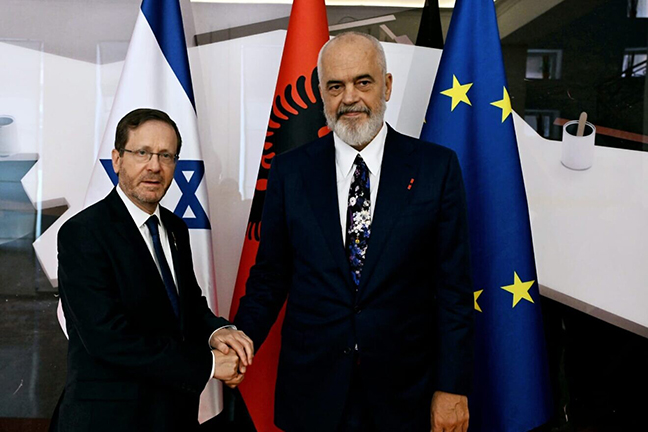UN holds anti-Israel session on Memorial Day, Israel’s ambassador lights candle and leaves

Israeli Ambassador to the United Nations Gilad Erdan lights a memorial candle for Israel’s fallen soldiers and those killed in terror attacks at the United Nations in New York on April 25, 2023. Source: Screenshot.
by Mike Wagenheim
(JNS) — Israeli Ambassador to the United Nations Gilad Erdan has long protested the U.N. Security Council’s lack of sensitivity towards and understanding of Israeli security needs.
But even by U.N. standards, a line was crossed on April 25, he said.
Russia, which holds the Security Council presidency this month, refused to change the date of the quarterly debate on the Israeli-Palestinian conflict. That day is Yom Hazikaron, Israel’s day of remembrance for its fallen soldiers and victims of terror.
“Each time I set foot in this chamber for these debates, I mentally prepare myself for the bias, falsehoods and singling out of Israel — the only liberal democracy in the region,” said Erdan, opening his remarks. “Yet today’s debate has crossed all lines. Not only am I both appalled and outraged to the very depths of my soul, but I am sad — very, very, sad.”
Yom Hazikaron, during which everyday life in Israel essentially grinds to halt, Erdan told the Security Council, “holds more sanctity to Israelis than almost any other day of the year.” He lashed out at the council, and Russia in particular, for refusing to reschedule the debate for another day.
He specifically chastised Russian Foreign Minister Sergey Lavrov, who chaired the council’s meetings on April 24 and 25.
“What would you do if this council was convening to single out and condemn the Russian Federation and your soldiers on the Ninth of May — on Victory Day over the Nazis?” posed Erdan.
Refusing to participate in the debate, Erdan placed a candle on the desk in front of him, lit a flame and recited the names of Israelis who, within the past year, fell in the line of duty or were killed by Palestinian terrorists.
“If this council refuses to respect their memory, I will dedicate this speech to their memory. I light this candle. Mr. President, to honor them and may their memory be blessed,” Erdan said. “I’m sorry, but I refuse to spend this sacred day listening to lies and condemnations. This debate disgraces the fallen, and Israel will not take part in it.”
‘This is a holy and special day for all Israelis’
Lavrov told a gathering of journalists that afternoon that he was surprised by Erdan’s statement. He said, contrary to Erdan’s opinion, Tuesday’s debate was not an anti-Israel event and that Security Council meetings are regularly held on national holidays.
He also claimed that Russia had not been informed of any Israeli concerns regarding the matter.
Documents viewed by JNS say otherwise.
JNS obtained an April 3 letter from Erdan addressed to Russian Ambassador to the United Nations Vassily Nebenzia. It came days after the council approved and published its agenda for the month.
“It pains me to see — despite numerous expert-level conversations on the matter — that a high-level Security Council Open Debate on the Situation in the Middle East including the Palestinian Question has been scheduled for April 25,” Erdan wrote in the letter. “As previously mentioned, this day holds deep significance to the State of Israel as it is Israel’s Remembrance Day for Fallen Soldiers and Victims of Terror.”
The Israeli diplomat added in the letter: “This is a holy and special day for all Israelis, and scheduling an Open Debate on Remembrance Day, during which relevant sides address the Security Council, does not meet the basic requirements for such a debate and is exceedingly inappropriate.”
Erdan added that Russia scheduling an open debate, requesting Israel’s participation, on such a day “shows indifference and dishonor to this hallowed day, and will directly impact my ability to represent Israel accordingly. Due to the fact that this is a matter of utmost importance, it is now being raised on the ambassadorial level. I request that the open debate be rescheduled so it does not fall on either Remembrance Day on April 25 or on Israel’s Independence Day on April 26.”
Nebenzia wrote back on April 11 that he had “immediately” passed along Erdan’s concerns to Moscow, but “as far as I understand, the answer has been already communicated to the Israeli side bilaterally,” according to a document shared with JNS.
A source at the Israeli mission to the United Nations said Russia never provided a definitive explanation why the date of the debate was not changed.
The mission, according to the source, sees Nebenzia’s flippant response and the refusal to change the date as an example of Russia’s negative attitude towards Israel at the United Nations since Israel explicitly began siding with Ukraine in its defense against Russia’s invasion.



